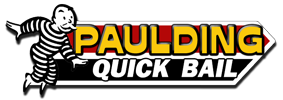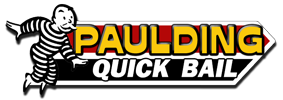General Questions
- Why choose Paulding Quick Bail? We understand that getting arrested can be a stressful experience. That's why we're available 24/7 to help you get your loved one out of jail quickly and efficiently. We've been serving the community since 1993, our team has over 35 years of experience. We're proud members of the Georgia Association of Professional Bondsmen and are committed to providing exceptional service to our community.
- What is bail? Bail is the money a defendant puts up to secure their release from jail before trial.
- What is a bail bond? A bail bond is a guarantee from a bail bonds company (like Paulding Quick Bail) to the court that the defendant will appear for all court hearings. If the defendant doesn't appear, the bail bond company is responsible for paying the bail amount to the court.
- What's the difference between bail and a bail bond?
Bail is the total amount of money set by the court for release. A bail bond is a service offered by a bail bond company. They act as a surety, paying the court the full bail amount. You, typically through a co-signer, pay the bail bond company a fee (usually around 10% of the bail amount) for their service.
- How do bail bonds agencies work? Bail bond companies work by charging a fee (usually a percentage of the bail amount) to secure the defendant's release. They may also require collateral, such as a car or property.
- What is a co-signer? A co-signer is someone who agrees to be financially responsible for the bail bond if the defendant fails to appear in court.
- Can a defendant act as their own co-signer? No, typically the co-signer must be someone other than the defendant.
What do I need to do to get someone out on bail?
- Call a reputable bail bond company, like Paulding Quick Bail.
- Be prepared to provide information about the defendant, including their name, date of birth, arrest charges, and location of incarceration (jail facility).
- You will likely need a co-signer who meets the bail bond company's requirements. This person guarantees the defendant shows up for court.
- You will need to pay the bail bond fee, and possibly additional charges.
The Bail Bond Process
- What is the bail bond process? If you are interested in the details on how the bond process works, you can read our blog post here “How Long Does it Take To Get Released from Jail on Bond.”
Here's how the process typically works:
- Booking and Bail Hearing: After arrest, you'll be booked, which can take some time. A judge will then set your bail amount during a bail hearing. This amount depends on the severity of the charges and your flight risk.
- Posting Bail with a Bondsman: To get released using a bail bond company, you'll need a cosigner, often a friend or family member. The cosigner signs a contract guaranteeing they'll be financially responsible if you miss court.
- Cosigner's Responsibilities: The cosigner's obligation lasts until the court case is finished and the bail company is released from its commitment. If you don't appear in court (skip bail), the cosigner must either bring you in or pay the full bail amount to the bonding company, who then forwards it to the court.
- Release from Jail: Once the cosigner signs and any paperwork is completed, the bail agent will handle your release from jail. This may involve additional steps at the jail facility.
Remember:
- Bail ensures your appearance in court, not your innocence.
- Missing court after posting bail can have serious consequences, including a warrant for your arrest and the cosigner being responsible for the full bail amount.
- How long does it take to get released? This can vary depending on how quickly the specific jail can process the paperwork and how crowded the jail is.
- Why is there a bond service fee? The bond service fee is the bail bond company's fee for their service.
- Can I get out of jail if I can't afford the entire fee? Some bail bond companies will work out a payment plan. This will allow the defendant to pay the bond service fee in payments until paid in full. If a defendant misses a payment and fails to maintain the payment plan, the bonding company can have the defendant re-arrested.
- How do I make payments on a payment plan? This will vary depending on the bail bond company's policy. Contact Paulding Quick Bail for more information.
- When is collateral needed? Collateral is typically required for high bail amounts or if the defendant is considered a flight risk.
- What are my responsibilities to Paulding Quick Bail after release? Your main responsibility is to appear for all court dates. You should also keep Paulding Quick Bail updated on your contact information.
- Do defendants with lawyers need to attend all court dates? Yes, even if you have a lawyer, you are still responsible for appearing in court.
- Do I need to check in with Paulding Quick Bail while waiting for trial? In most circumstances, no check in is required. However, you should confirm this with your bonding agent at Paulding Quick Bail to confirm their requirements.
- Why is it important to keep my contact information up to date? Paulding Quick Bail needs to be able to reach you with any important information about your case.
- How long will I be out on bail? This depends on the outcome of your court case.
- How can I find my court date information? The court will provide you with this information when you are released on bail. You may also be able to find it online or by calling the clerk of court's office.
- Can I travel if I have a court date pending? You should consult with your lawyer before traveling out of state.
- What happens if I don't pay the bail bond company? If you fail to make your payments, the company may take legal action to collect the debt.
- Will a bonding company arrest me if I miss a court date? No, the bail bond company cannot arrest you. However, they may hire a bounty hunter to track you down and bring you back to court.
- What is a bench warrant? A bench warrant is an order for your arrest issued by the court if you fail to appear for a

